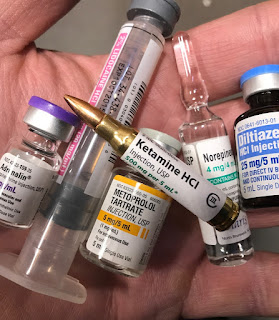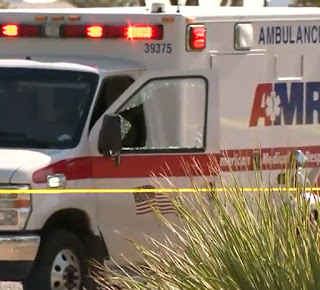The Middletown Zone
In the distant future a man witnesses two thieves attempting to steal a car. He approaches them and they spot him, at first fearing that they've been caught. They quickly breathe a sigh of relief, however, when they notice a curious mark on his forehead. It is the mark placed there as punishment for his crime of coldness - not opening his emotions to his fellow citizens. He's an "invisible". A convicted criminal, his sentence of invisibility means that nobody is allowed to acknowledge him, speak to him, or pay him any attention whatsoever. He is shunned by everyone.
The criminals continue their efforts, and once they succeed in stealing the car, they drive after the man in a laughter-filled vehicular attack. He flees, but the thieves strike him with the car and leave him for dead. The man is able to drag himself home and get to his video telephone. He is in pain and he calls for medical help. The nurse who answers his call says she'll gladly send help once she gets facial recognition by having him turn his face to the screen. When he does this, she sees the mark and without a word terminates his call.
In the not-too-distant future, another emergency call is made. It's a 911 call by a desperate mother. She reports that her adult son is on the floor and appears to not be breathing. She states that he has a history of drug use. The dispatcher who answers the call asks for the man's name, and upon feeding that information into a computer learns that the victim has been treated multiple times for heroin overdoses in the past. The dispatcher also receives information that the victim was sentenced to community service, but has not fulfilled his service obligation. The mother listens in horror as the dispatcher dutifully says "I'm sorry, ma'am. Your'e on your own." and hangs up. The mother attempts CPR until exhaustion and her son dies.
The first scenario is science-fiction. It's the plot line from a 1986 Twilight Zone episode called "To See the Invisible Man." In the episode the main character lives in a dystopian society with an interesting criminal justice system.
The second scenario - is it also a Twilight Zone episode? Not at all. It's 2017 Middletown, Ohio, and the narrator isn't Rod Sterling, it's City Council member Dan Picard. Picard is concerned about the growing opioid epidemic and the amount of money the city is spending on the Narcan EMS is using to treat these overdoses. He's proposed a "three-strikes" system. In his words:
“If the dispatcher determines that the person who’s overdosed is someone who’s been part of the program for two previous overdoses and has not completed the community service and has not cooperated in the program, then we wouldn’t dispatch.”
If you didn't quite catch that, let me spell it out for clarification. A City Council member in Middletown is proposing that 911 dispatchers hang up on a request for life-saving treatment.
The opioid problem is not unique to Middletown. Cities across the country are experiencing a taxing increase in overdose calls which is, of course, costing municipalities and response agencies not only dollars in supplies, but operational burdens as EMS providers are frequently tied up on calls for repeat-offenders. There IS a concern. There IS a costly problem. Somewhere there may be a fix for it. A government death sentence is not the answer. I say "death sentence" because what Picard is proposing is just that. He's asking an emergency dispatcher and an EMS system to deliberately end a life by withholding medical care. Not only is it a death sentence, but it's a cruel and unusual death sentence, for depending on the severity and time of the overdose, a victim may take many minutes or even an hour to actually die - gasping for an occasional breath and slowly becoming acidotic while their brain swells and their other organs slowly shut down.
Picard apparently plans on having friends and families of these addicts witness the event as well, because the unconscious overdose patients are certainly not calling 911 for themselves.
Let me be perfectly clear: I have spent a career visiting the depraved, the criminal, and the indifferent. I've experienced disgusting injuries, disgusting people, and disgusting living conditions. I have seen festering, maggot-filled wounds, men with portions of their heads missing from self-inflicted gunshot wounds, and children beaten, neglected and even killed by caretakers. I once saw a man whose entire body was charred down to his bones in a house fire. I apologize for these graphic depictions, but I need to use them as benchmarks because in ugliness they pale in comparison to the suggestion that we, who are sworn to protect and serve, who have dedicated our lives to compassion and service to our communities, play judge and jury with people's lives, ignore their cries for help, and literally leave them to die. After all I've seen in 25 years in EMS I rarely ever say "I can't believe it." But I can't believe this. I can't believe someone could propose it, I can't believe that someone would support it, and I can't believe that it's being seriously considered by anyone. The Twilight zone has nothing on Dan Picard.

This proposal is immoral, unethical, and should be criminal. We should all be afraid of the possible precedent, for who knows which patients will be ignored next. COPD patients who still smoke? Liver failure patients who are alcoholics? Heart attack victims who still eat baked goods?
Make no mistake - if this proposal comes to fruition, there truly is a fifth dimension beyond that which is known to man. It is a dimension as vast as space and as timeless as infinity. It is the middle ground between light and shadow, between science and superstition, and it lies between the pit of man's fears and the summit of his knowledge. This is the dimension of imagination. It is an area which we call Middletown, Ohio.
The criminals continue their efforts, and once they succeed in stealing the car, they drive after the man in a laughter-filled vehicular attack. He flees, but the thieves strike him with the car and leave him for dead. The man is able to drag himself home and get to his video telephone. He is in pain and he calls for medical help. The nurse who answers his call says she'll gladly send help once she gets facial recognition by having him turn his face to the screen. When he does this, she sees the mark and without a word terminates his call.
In the not-too-distant future, another emergency call is made. It's a 911 call by a desperate mother. She reports that her adult son is on the floor and appears to not be breathing. She states that he has a history of drug use. The dispatcher who answers the call asks for the man's name, and upon feeding that information into a computer learns that the victim has been treated multiple times for heroin overdoses in the past. The dispatcher also receives information that the victim was sentenced to community service, but has not fulfilled his service obligation. The mother listens in horror as the dispatcher dutifully says "I'm sorry, ma'am. Your'e on your own." and hangs up. The mother attempts CPR until exhaustion and her son dies.
The first scenario is science-fiction. It's the plot line from a 1986 Twilight Zone episode called "To See the Invisible Man." In the episode the main character lives in a dystopian society with an interesting criminal justice system.
The second scenario - is it also a Twilight Zone episode? Not at all. It's 2017 Middletown, Ohio, and the narrator isn't Rod Sterling, it's City Council member Dan Picard. Picard is concerned about the growing opioid epidemic and the amount of money the city is spending on the Narcan EMS is using to treat these overdoses. He's proposed a "three-strikes" system. In his words:
“If the dispatcher determines that the person who’s overdosed is someone who’s been part of the program for two previous overdoses and has not completed the community service and has not cooperated in the program, then we wouldn’t dispatch.”
If you didn't quite catch that, let me spell it out for clarification. A City Council member in Middletown is proposing that 911 dispatchers hang up on a request for life-saving treatment.
The opioid problem is not unique to Middletown. Cities across the country are experiencing a taxing increase in overdose calls which is, of course, costing municipalities and response agencies not only dollars in supplies, but operational burdens as EMS providers are frequently tied up on calls for repeat-offenders. There IS a concern. There IS a costly problem. Somewhere there may be a fix for it. A government death sentence is not the answer. I say "death sentence" because what Picard is proposing is just that. He's asking an emergency dispatcher and an EMS system to deliberately end a life by withholding medical care. Not only is it a death sentence, but it's a cruel and unusual death sentence, for depending on the severity and time of the overdose, a victim may take many minutes or even an hour to actually die - gasping for an occasional breath and slowly becoming acidotic while their brain swells and their other organs slowly shut down.
Picard apparently plans on having friends and families of these addicts witness the event as well, because the unconscious overdose patients are certainly not calling 911 for themselves.
Let me be perfectly clear: I have spent a career visiting the depraved, the criminal, and the indifferent. I've experienced disgusting injuries, disgusting people, and disgusting living conditions. I have seen festering, maggot-filled wounds, men with portions of their heads missing from self-inflicted gunshot wounds, and children beaten, neglected and even killed by caretakers. I once saw a man whose entire body was charred down to his bones in a house fire. I apologize for these graphic depictions, but I need to use them as benchmarks because in ugliness they pale in comparison to the suggestion that we, who are sworn to protect and serve, who have dedicated our lives to compassion and service to our communities, play judge and jury with people's lives, ignore their cries for help, and literally leave them to die. After all I've seen in 25 years in EMS I rarely ever say "I can't believe it." But I can't believe this. I can't believe someone could propose it, I can't believe that someone would support it, and I can't believe that it's being seriously considered by anyone. The Twilight zone has nothing on Dan Picard.

This proposal is immoral, unethical, and should be criminal. We should all be afraid of the possible precedent, for who knows which patients will be ignored next. COPD patients who still smoke? Liver failure patients who are alcoholics? Heart attack victims who still eat baked goods?
Make no mistake - if this proposal comes to fruition, there truly is a fifth dimension beyond that which is known to man. It is a dimension as vast as space and as timeless as infinity. It is the middle ground between light and shadow, between science and superstition, and it lies between the pit of man's fears and the summit of his knowledge. This is the dimension of imagination. It is an area which we call Middletown, Ohio.


Comments
Post a Comment